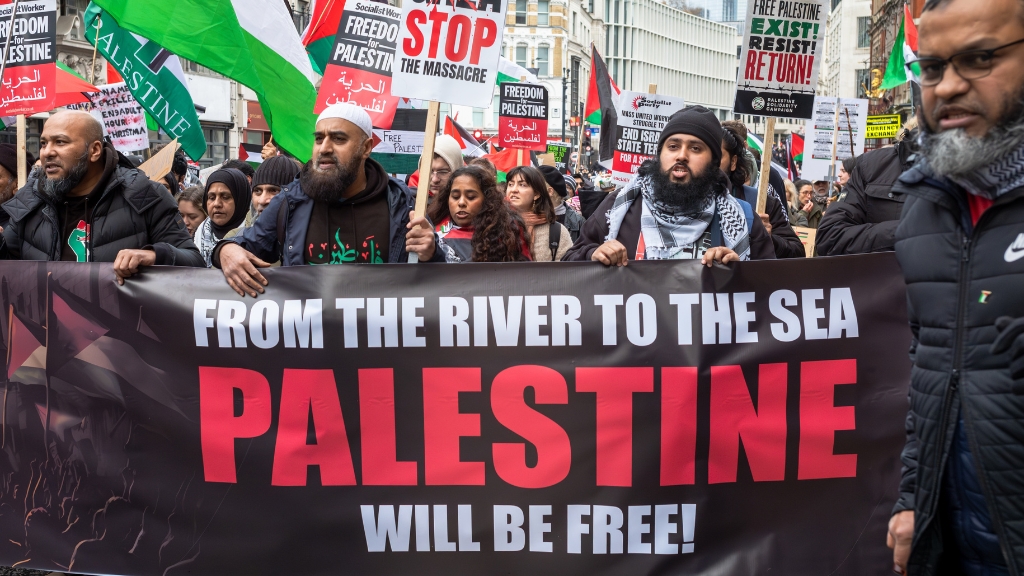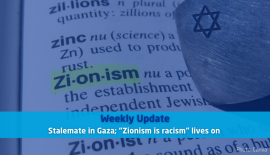The Need to Acknowledge Muslim Antisemitism
Britain may be an outlier for now, but America is not far behind.
(3 July 2025) This week, Britain has been consumed by the appalling spectacle at the Glastonbury Festival, where the rap duo Bob Vylan led thousands in chanting “Death, death to the IDF,” alongside vicious remarks about Jews and Zionists.
While most politicians condemned the incitement to murder, many tempered their outrage by criticising Israel’s conduct. Labour minister Wes Streeting said that while violence couldn’t be justified, Israel’s actions had made it hard for allies to offer support, adding that the Israeli embassy should “get your own house in order.”
Yet it’s precisely that demonisation of Israel—fueled by an unrelenting stream of lies and distortions—that incites many to endorse the murder of Israelis.
Further evidence came this week when Channel 4 screened a film about Gaza that the BBC had previously abandoned after it emerged that the narrator of an earlier version was the son of Hamas’s deputy agriculture minister. Channel 4’s version was pure Hamas propaganda, accusing the Israel Defense Forces of deliberately bombing Gaza hospitals —without noting that Hamas had turned those hospitals into terrorist hubs, making them legitimate military targets and examples of Hamas war crimes.
Not only did Channel 4 air this travesty, but over 400 media and entertainment figures, including 111 BBC journalists, signed a letter to BBC management claiming its decision to drop the film “demonstrates, once again, that the BBC is not reporting ‘without fear or favour’ when it comes to Israel.” They even called for the removal of BBC board member Robbie Gibb, citing a “conflict of interest” because he had previously been on the board of The Jewish Chronicle.
Given the BBC’s long-standing hostility to Israel and distortion of its reporting, the signatories’ claim was Orwellian—evidence of the deranged discourse among obsessive Israel-haters.
To all this, many in Israel and America simply shake their heads and dismiss it as “bad things happening in other places.” There is a widespread belief in both countries that Britain is a lost cause and thus irrelevant.
failure to act against those chanting
“Globalise the intifada”
Looking at the Labour government’s boycott and sanctions against Israel, the election of five MPs on a ‘Gaza-Palestine’ platform, or the British police’s failure to act against those chanting “Globalise the intifada” while arresting critics of Islam online, many Americans believe Britain has collapsed under the pressure of radicalised elements within its growing Muslim population.
As for Israelis, their contempt is barely concealed. In the midst of a bitter war—where Israel feels it is fighting for existential stakes—many express frustration at the lack of a coherent, timely response to the tsunami of falsehoods shaping British discourse. Israel’s long-standing inability to mount a compelling counter-narrative has left its reputation vulnerable.
Some in Israel’s political class argue that British culture is so historically and ineradicably antisemitic that trying to shift public opinion is pointless. But this is a serious mistake.
While true antisemites are immune to facts, many ordinary Britons have absorbed lies about Israel simply because no one ever told them the truth. This vacuum of accurate information has even led some in Britain’s Jewish community—longstanding supporters of Israel—to now believe that Israel has ‘gone too far’, falling prey to relentless propaganda.
It’s also a mistake to assume that what happens in Britain stays in Britain. The UK remains a cultural leader across the English-speaking world. British trends have a habit of spreading to the US, Canada, and Australia.
The same ideological forces—what’s often called the ‘red-green alliance’ between the progressive left and radical Islam—that have reshaped Britain are also active in America. Just as that alliance overtook the Labour Party, it is increasingly dominant in the Democratic Party.
Recent events underscore this shift. Islamist and far-left figure Zohran Mamdani was selected as the official Democratic candidate for New York mayor. Meanwhile, at Columbia University, acting president Claire Shipman was forced to apologise after private texts showed she had questioned whether Jewish trustee Shoshana Shendelman was a ‘mole’ or a ‘fox in the henhouse’ during a debate about ending a pro-Palestinian encampment. Shipman also expressed a desire to add “somebody from the Middle East or who is Arab” to the board—raising troubling questions about identity politics and anti-Jewish suspicion in elite institutions.
The Palestinian cause has become a Trojan horse for radical Islam. It cloaks a death cult in the language of humanitarianism and anti-colonialism, falsely portraying Israel as an oppressor.
This entire narrative is false, yet it has become the default view of the West’s progressive elites. It rests on ignorance—of history, of Zionism, of the region. The Jews are the indigenous people of the land; Zionism is a decolonisation movement. And it rests on a deeper ignorance of the real cause of this enduring hatred: Muslim antisemitism.
All polling shows that antisemitism is far more prevalent in Muslim communities than elsewhere. Yet this truth is almost never spoken. It remains the elephant in the room. Diaspora Jews are reluctant to talk about it, even though they are targeted by it. And broader society remains silent, cowed by accusations of ‘Islamophobia’.
“The issue of inter- minority prejudice is often regarded as too sensitive to address.”
But now, the situation is growing so dangerous that this taboo is beginning to break. A recent report by Britain’s Counter Extremism Group, titled Islamist Antisemitism: A Neglected Hate, attempts to tackle this issue. It rightly notes: “The issue of inter- minority prejudice is often regarded as too sensitive to address.”
The report acknowledges that hostility toward Jews in the Muslim world is rooted in Islamic religious texts. It notes that periods of Jewish security in Muslim lands were historically punctuated by times of oppression and pogroms.
It also highlights the disturbing historical links between Palestinian Arab leaders and the Nazis—connections that spawned the enduring lie of a Jewish genocide of Palestinian Arabs’. And it shows how Islamic extremists have weaponised the Palestinian cause to inflame hatred of Jews worldwide.
However, even this report falls short by focusing primarily on jihadi groups like Hamas, Hezbollah, and the Muslim Brotherhood. It avoids confronting the broader and more disturbing reality: antisemitism runs deep among many non-extremist, grassroots Muslims who may oppose violence but still hold toxic views about Jews.
Israel’s failure to counter libels has fueled the falsehood that Jews are uniquely violent, while obscuring the far more widespread antisemitism in the Muslim world.
Ignoring Muslim antisemitism has let a deadly falsehood spread, turning whole communities—not just extremists —against Jews. Unless Britain and America confront this openly, both may be lost.






